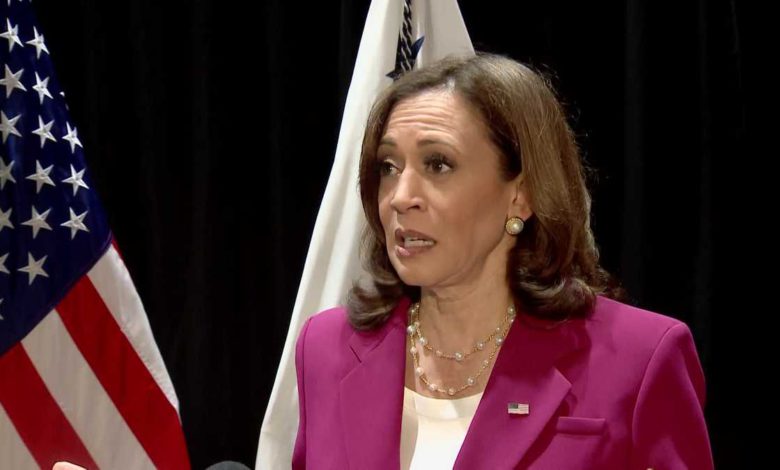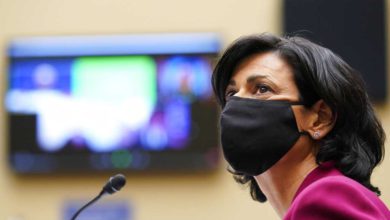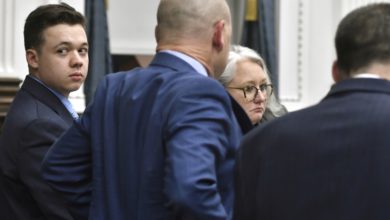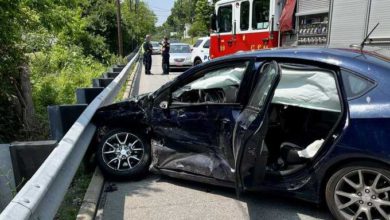

Vice President Kamala Harris was in New Orleans Saturday speaking at the annual Essence Festival of Culture.Harris spoke on the Wealth and Power stage about the impacts of the Supreme Court's ruling to overturn Roe v. Wade, as well as other issues facing women of color.After her speech at the festival, Harris spoke exclusively with Hearst-owned WDSU about the impacts of Louisiana's abortion trigger laws in place."We as Americans prided ourselves on the foundational principles of freedom and liberty," Harris said. "When we say the government can interfere and make decisions instead of letting a woman and her family, pastor or priest make that decision, I think that is a real moment of crisis, frankly."Harris expressed her disappointment in the Supreme Court's decision, and that it was the government's responsibility the protect people's rights."We rightly hold ourselves out to be a nation that is a democracy founded on very important principles that include that we will protect and ensure people's rights," Harris said. "This is the first time in the history of the court that a right that had been recognized has been taken away from women in America. It is pretty serious."Louisiana's trigger laws make most abortions illegal in the state.Under a law signed by former Gov. Kathleen Blanco, a Democrat, most abortions would become illegal almost immediately upon the overturning of Roe.The original 2006 statute allows for prison terms of one to five years and fines of $5,000 to $50,000 for abortion providers.Senate Bill 342, sponsored by Sen. Katrina Jackson, D-Monroe, increases the penalties to one to 10 years of prison time and fines of $10,000 to $100,000.This bill was signed by Gov. John Bel Edwards on June 22.Neither the original statute nor the newly signed bill has exceptions for rape or incest.Jackson's bill outlines what would not be considered abortion in Louisiana:A medical procedure with the intention to save the life or preserve the health of an unborn childThe removal of a dead unborn child or the inducement of a positive diagnosis certified in writing in the Women's medical record and an ultrasound test that the pregnancy ends in a miscarriageThe removal of an ectopic pregnancyThe performance of a medical procedure necessary in good faith or reasonable medical judgement to prevent death or substantial risk of death to the pregnant woman due to a physical condition or to prevent the serious permanent impairment of a life-sustaining organ of a pregnant woman. However, the physician shall make reasonable medical efforts under the circumstance to preserve the life of the mother and unborn child in a manner that is consistent with reasonable medical practiceThe removal of an unborn child who is deemed to be medical futile, a judgement certified by two qualified physicians in the woman's medical recordJackson's law also requires any abortion deemed medically necessary to be done in a licensed medical facility. Physicians will also be required to send an abortion report.An abortion-inducing drug or chemical is also now illegal in Louisiana when used to cause an abortion.A state district judge in New Orleans has temporarily blocked the trigger law that makes abortions illegal in the state of Louisiana.Louisiana’s attorney general is warning doctors against performing abortions, despite the judge’s order blocking the state from enforcing its ban on the procedure.Attorney General Jeff Landry said that the state judge’s Monday order blocking enforcement “has limited reach” and that abortion remains a crime in Louisiana after Friday’s Supreme Court decision ending abortion rights.
Vice President Kamala Harris was in New Orleans Saturday speaking at the annual Essence Festival of Culture.
Harris spoke on the Wealth and Power stage about the impacts of the Supreme Court's ruling to overturn Roe v. Wade, as well as other issues facing women of color.
After her speech at the festival, Harris spoke exclusively with Hearst-owned WDSU about the impacts of Louisiana's abortion trigger laws in place.
"We as Americans prided ourselves on the foundational principles of freedom and liberty," Harris said. "When we say the government can interfere and make decisions instead of letting a woman and her family, pastor or priest make that decision, I think that is a real moment of crisis, frankly."
Harris expressed her disappointment in the Supreme Court's decision, and that it was the government's responsibility the protect people's rights.
"We rightly hold ourselves out to be a nation that is a democracy founded on very important principles that include that we will protect and ensure people's rights," Harris said. "This is the first time in the history of the court that a right that had been recognized has been taken away from women in America. It is pretty serious."
Louisiana's trigger laws make most abortions illegal in the state.
Under a law signed by former Gov. Kathleen Blanco, a Democrat, most abortions would become illegal almost immediately upon the overturning of Roe.
The original 2006 statute allows for prison terms of one to five years and fines of $5,000 to $50,000 for abortion providers.
Senate Bill 342, sponsored by Sen. Katrina Jackson, D-Monroe, increases the penalties to one to 10 years of prison time and fines of $10,000 to $100,000.
This bill was signed by Gov. John Bel Edwards on June 22.
Neither the original statute nor the newly signed bill has exceptions for rape or incest.
Jackson's bill outlines what would not be considered abortion in Louisiana:
- A medical procedure with the intention to save the life or preserve the health of an unborn child
- The removal of a dead unborn child or the inducement of a positive diagnosis certified in writing in the Women's medical record and an ultrasound test that the pregnancy ends in a miscarriage
- The removal of an ectopic pregnancy
- The performance of a medical procedure necessary in good faith or reasonable medical judgement to prevent death or substantial risk of death to the pregnant woman due to a physical condition or to prevent the serious permanent impairment of a life-sustaining organ of a pregnant woman. However, the physician shall make reasonable medical efforts under the circumstance to preserve the life of the mother and unborn child in a manner that is consistent with reasonable medical practice
- The removal of an unborn child who is deemed to be medical futile, a judgement certified by two qualified physicians in the woman's medical record
Jackson's law also requires any abortion deemed medically necessary to be done in a licensed medical facility. Physicians will also be required to send an abortion report.
An abortion-inducing drug or chemical is also now illegal in Louisiana when used to cause an abortion.
A state district judge in New Orleans has temporarily blocked the trigger law that makes abortions illegal in the state of Louisiana.
Louisiana’s attorney general is warning doctors against performing abortions, despite the judge’s order blocking the state from enforcing its ban on the procedure.
Attorney General Jeff Landry said that the state judge’s Monday order blocking enforcement “has limited reach” and that abortion remains a crime in Louisiana after Friday’s Supreme Court decision ending abortion rights.
Source link








